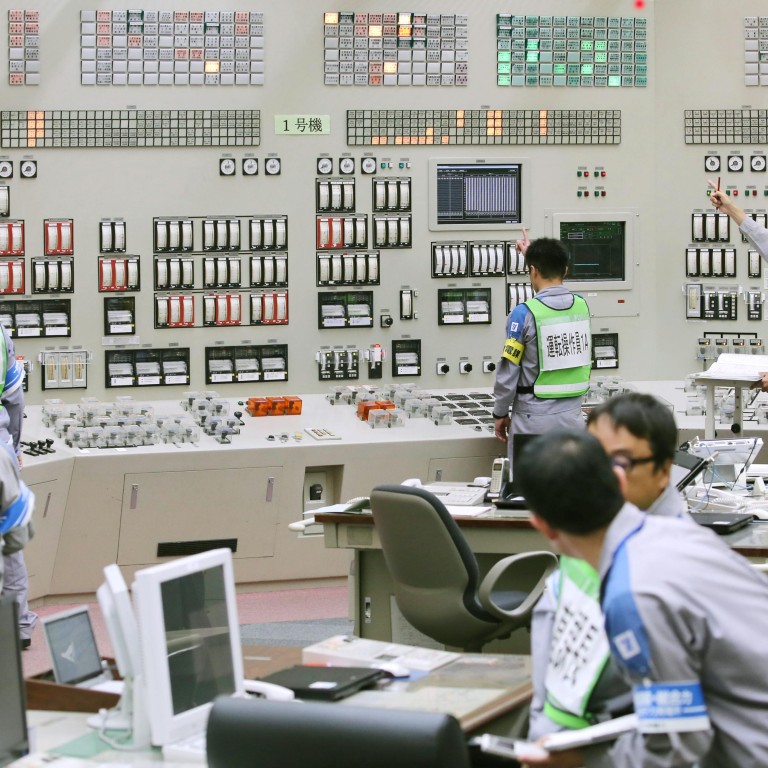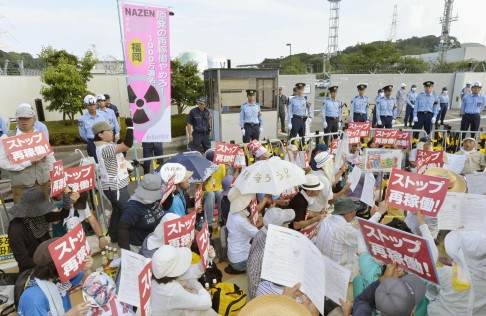
Japan restarts nuclear reactor four years after Fukushima disaster
A power plant operator in southern Japan has restarted a reactor, the first to begin operating under new safety requirements following the Fukushima disaster.
Kyushu Electric Power Co. said Tuesday it had restarted the No. 1 reactor at its Sendai nuclear plant as planned. The restart marks Japan’s return to nuclear energy four-and-half-years after the 2011 meltdowns at the Fukushima Dai-ichi nuclear power plant in northeastern Japan following an earthquake and tsunami.
The national broadcaster NHK showed plant workers in the control room as they turned the reactor back on. Tomomitsu Sakata, a spokesman for Kyushu Electric Power, said the reactor was put back online as planned without any problems.
The disaster displaced more than 100,000 people due to radioactive contamination in the area and spurred a national debate over this resource-scarce country’s reliance on nuclear power.
The Nuclear Regulation Authority affirmed the safety of the Sendai reactor and another one at the plant last September under stricter safety rules imposed after the 2011 accident.
All of Japan’s nuclear plants were shut down for the past two years. To offset the shortfall in power output, the country ramped up imports of oil and gas and fired up more thermal power plants, slowing progress toward reducing its emissions of greenhouse gases.

Protestors gather
Blasting the restart as a hasty decision, a crowd of about 100 people gathered at the gates of the nuclear power plant.
Some residents, however, were hopeful that it would boost the local economy.
“We cannot live here without a nuclear plant. Once it is restarted, we would get money from the state and the town would thrive,” said an 81-year-old man at a local shopping arcade.
People in Fukushima also have mixed feelings. While many in the prefecture devastated by the disaster oppose nuclear power, some admit the economic benefits of having a nuclear power plant.
“Why did they choose to restart it on the 11th when the reactivation itself is heart-wrenching enough?” said Haruko Kanai, who evacuated from Namie, Fukushima Prefecture, following the nuclear disaster.
“I feel a swirl of anger, sorrow and disillusionment,” said the 66-year-old woman. “I don’t want others to experience the same suffering that I have.”
Fumio Iwakura, 67, who has been forced to suspend his work as an electrician and has lived in temporary housing in the Fukushima city of Nihonmatsu since the meltdowns, was critical of the restart.
“It makes me wonder if they have really considered the seriousness of what happened in Fukushima,” he said.
The Mayors for a Nuclear Power Free Japan network, comprised of incumbent and former chiefs of 37 prefectures, also released a statement of protest that said local people cannot live with a sense of security under the current framework of allowing nuclear plant operation.
The statement said the effectiveness of the evacuation plan for municipalities in a 30-kilometer radius of the Sendai complex has not been verified and other surrounding municipalities are not receiving sufficient information from the utility, it said.
Additional reporting by Kyodo

